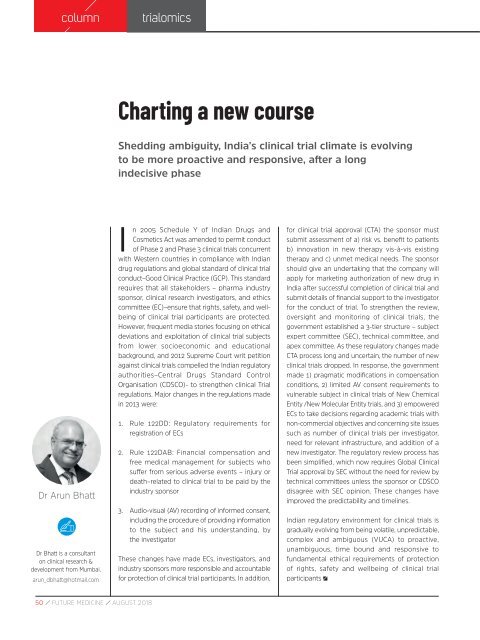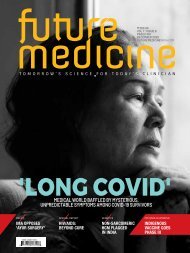FM AUGUST 2018 ISSUE1 - digital edition
You also want an ePaper? Increase the reach of your titles
YUMPU automatically turns print PDFs into web optimized ePapers that Google loves.
column<br />
trialomics<br />
Charting a new course<br />
Shedding ambiguity, India’s clinical trial climate is evolving<br />
to be more proactive and responsive, after a long<br />
indecisive phase<br />
Dr Arun Bhatt<br />
Dr Bhatt is a consultant<br />
on clinical research &<br />
development from Mumbai.<br />
arun_dbhatt@hotmail.com<br />
I<br />
n 2005 Schedule Y of Indian Drugs and<br />
Cosmetics Act was amended to permit conduct<br />
of Phase 2 and Phase 3 clinical trials concurrent<br />
with Western countries in compliance with Indian<br />
drug regulations and global standard of clinical trial<br />
conduct–Good Clinical Practice (GCP). This standard<br />
requires that all stakeholders – pharma industry<br />
sponsor, clinical research investigators, and ethics<br />
committee (EC)–ensure that rights, safety, and wellbeing<br />
of clinical trial participants are protected.<br />
However, frequent media stories focusing on ethical<br />
deviations and exploitation of clinical trial subjects<br />
from lower socioeconomic and educational<br />
background, and 2012 Supreme Court writ petition<br />
against clinical trials compelled the Indian regulatory<br />
authorities–Central Drugs Standard Control<br />
Organisation (CDSCO)- to strengthen clinical Trial<br />
regulations. Major changes in the regulations made<br />
in 2013 were:<br />
1. Rule 122DD: Regulatory requirements for<br />
registration of ECs<br />
2. Rule 122DAB: Financial compensation and<br />
free medical management for subjects who<br />
suffer from serious adverse events – injury or<br />
death–related to clinical trial to be paid by the<br />
industry sponsor<br />
3. Audio-visual (AV) recording of informed consent,<br />
including the procedure of providing information<br />
to the subject and his understanding, by<br />
the investigator<br />
These changes have made ECs, investigators, and<br />
industry sponsors more responsible and accountable<br />
for protection of clinical trial participants. In addition,<br />
for clinical trial approval (CTA) the sponsor must<br />
submit assessment of a) risk vs. benefit to patients<br />
b) innovation in new therapy vis-à-vis existing<br />
therapy and c) unmet medical needs. The sponsor<br />
should give an undertaking that the company will<br />
apply for marketing authorization of new drug in<br />
India after successful completion of clinical trial and<br />
submit details of financial support to the investigator<br />
for the conduct of trial. To strengthen the review,<br />
oversight and monitoring of clinical trials, the<br />
government established a 3-tier structure – subject<br />
expert committee (SEC), technical committee, and<br />
apex committee. As these regulatory changes made<br />
CTA process long and uncertain, the number of new<br />
clinical trials dropped. In response, the government<br />
made 1) pragmatic modifications in compensation<br />
conditions, 2) limited AV consent requirements to<br />
vulnerable subject in clinical trials of New Chemical<br />
Entity /New Molecular Entity trials, and 3) empowered<br />
ECs to take decisions regarding academic trials with<br />
non-commercial objectives and concerning site issues<br />
such as number of clinical trials per investigator,<br />
need for relevant infrastructure, and addition of a<br />
new investigator. The regulatory review process has<br />
been simplified, which now requires Global Clinical<br />
Trial approval by SEC without the need for review by<br />
technical committees unless the sponsor or CDSCO<br />
disagree with SEC opinion. These changes have<br />
improved the predictability and timelines.<br />
Indian regulatory environment for clinical trials is<br />
gradually evolving from being volatile, unpredictable,<br />
complex and ambiguous (VUCA) to proactive,<br />
unambiguous, time bound and responsive to<br />
fundamental ethical requirements of protection<br />
of rights, safety and wellbeing of clinical trial<br />
participants<br />
50 / FUTURE MEDICINE / <strong>AUGUST</strong> <strong>2018</strong>


















